Peace Watch » Editor's Take, Featured » Munshi Ishaq Has Demolishes Myths About Leaders- My Take
Munshi Ishaq Has Demolishes Myths About Leaders- My Take
Presentation on Book Nidaa-e-Haque
By
Z.G. Muhammad
Chairperson: Dr. Sheikh Mohammad Iqbal, Guest of Honor, Dr. Altaf Hussain, man of the moment Munshi Ghulam Hassan – and distinguished scholars and friends.
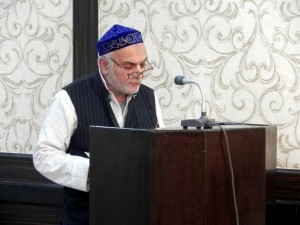 It is a moment of pride for me, to have been invited to present my take on the memoirs of a great son of the soil Munshi Mohammad Ishaq – one of the towering leaders of Kashmir’s struggle against autocracy and in the post 1947 scenario a powerful voice of dissent and one of the founding leaders of the Plebiscite Front who remained in vanguard of the struggle for right to self-determination of people of Jammu and Kashmir till his death.
It is a moment of pride for me, to have been invited to present my take on the memoirs of a great son of the soil Munshi Mohammad Ishaq – one of the towering leaders of Kashmir’s struggle against autocracy and in the post 1947 scenario a powerful voice of dissent and one of the founding leaders of the Plebiscite Front who remained in vanguard of the struggle for right to self-determination of people of Jammu and Kashmir till his death.
Friends, you heard erudite presentations by eloquent speakers and incisive reviews by friends like Professor Hameedah Nayeem and historian Dr. Abdul Ahad before me. After scholarly presentations- you will have to bear with my humble way of looking at the book that is going to be formally released today.
True, autobiographies are subjective. Nonetheless, in the resistance movement, they work as guides in identifying the pitfalls and potholes that been worked as impediments in achieving the goal. For biographies enabling us to know about behind the scene development that have affected people or the nations work as lodestars for guiding the future generation engaged in the resistance movements or in the nation building. Moreover, the biographies exposing hideous designs of the powers that or revealing hitherto unknown chivalry of some leaders or sacrifices of the political workers enrich the national narrative. Unfortunately, in Kashmir resistance that date backs to nineteenth century there has been no tradition of publishing memoirs. 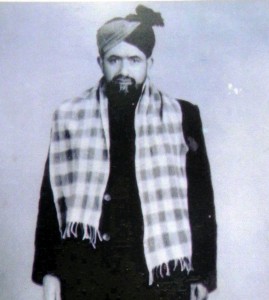
Contemporary, history of Kashmir suffers many missing links and distortions as hardly any of the protagonists of our political movement from 1931 to 1947 or from 1947 to 1990 have published their memoirs. Important correspondence between Kashmir leaders and leaders of the sub-continent have also been confined to the cupboards to gather dust. Had this correspondence been made public like that of correspondence between Nehru, Jinnah, Patel and Mountbatten it would not only had brought to light machinations and conspiracies of villainous characters in our movement but would have also helped in fighting back the denial mode in New Delhi and defeating its policy of procrastination towards resolving the Kashmir dispute. Importance of such correspondence for strengthening Kashmir narrative can be understood in the blanket ban imposed by GOI on making documents about Kashmir public. The National Archives or the Nehru Museum has been denying access to Kashmir related papers not only to scholars and researchers from Kashmir only but from outside. You will be surprised even scholars like Charealekha Zutshi and Mridu Rai were denied access to papers not only about Kashmir problem but right from 1819.
Looking in this perspective at the recently published memoirs of Munshi Mohammad Ishaq, I see it as important contribution for connecting the missing links of contemporary Kashmir history.
Let may say it with all frankness, I even see posthumously published autobiography of Sheikh Mohammad Abdullah with all its subjectivity and prejudices as an important source material for understanding the political dynamics of the period.
In 1947 rule of feudal autocracy ended but it did not usher in democracy. It was beginning of new rule where individual liberties and freedom of expression was denied- something akin to neo-fascism. while weaving myths around their leader and orchestrating the “dominant discourse” the new class of politicians made the truth first causality. This resulted in clouding, contorting and confusing history of most important juncture in our history that is 1947. Thanks to Western scholars like Stanley Wolpert, Allister Lamb and Christopher Snedden for unveiling the truth. 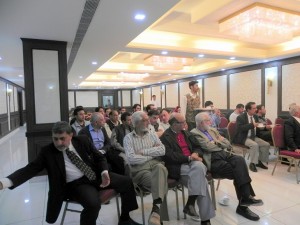
The memoirs of Late Haji Munshi Muhammad Ishaq, one of the prominent leaders in the Kashmir Struggle from early thirties to late sixties and a very close confident of Sheikh Muhammad Abdullah is an important addition to the contemporary Kashmir history. It is the diaries maintained by the author over years and some scribed by him during imprisonments at different phases of the political struggle that have provided warp and woof to these memoirs.
This in fact is the first inside story by one of the important leaders of the struggle against autocracy, and witness to the misgovernment after 1947- that was largely marked by political vendetta, hooliganism and corruption.
This book is first major work on twenty-two years movement for right to self-determination led by the Plebiscite Front. I for one believe that the book is first of its kind that provides an insight into, the struggle of the Plebiscite Front.
The 464 page memoirs in Urdu, titled Nida-e-Haq edited by Munshi Ghulam Hassan, son of the author, a scholar and historian in his own right is important for a variety of reasons. One, after Sheikh Abdullah these are the first memoirs by a top leader close to him. Second, for the author being central figure during the 1946 Quit Kashmir movement, with his office in Rawalpindi, the book splits beans and exposes the dubious role played by some important National Conference leaders during their self-exiled days in Delhi and Punjab. Third, the memoirs are important for understanding the birth and the death of the Plebiscite Front.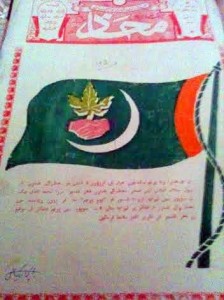
The comprehensive preface to the book by the editor works as an appetizer that stimulates a reader to remain glued to the lucidly written book from page one to the last page- with every page-taking lid off from some hideous plots that contributed to the birth of the Kashmir dispute, its perpetuation and sufferings of the people. In his preface, the author with subtlety tells that his father right in 1969 had realized that Sheikh Abdullah and Mirza Muhammad Afzal Beg wanted to retract their steps and saw the party decision to participate in the Panchayat elections as betrayal of the cause.
The memoirs’ of Munshi Ishaq are different from biographies of other leaders in as much as much as, these are not aimed at self-glorification but telling truth about perfidy of top leaders with compunction. The exchange of correspondence between the author and Sheikh Muhammad Abdullah, Bakshi Ghulam Muhammad, Ghulam Mohammad Sadiq and some other leaders during 1946 and 1947 lends authenticity to some untold stories told for the first time in the book.
These letters also tell about the hardship faced by the leaders during the struggle and how their families suffered immensely during trying times. In one of the letters Sheikh Abdullah from Reasi jail, writes to Munshi Ishaq to support his family by providing Begum Abdullah monthly Rs. 150 for meeting the monthly expenses as Ghulam Mohi-u-Din Qara had not done the same. This letter was sent by Sheikh Abdullah at a time ‘Mohi-u-Din Qara was collecting huge donations in the name of Quit Kashmir Movement’ and outside the state Bakshi Ghulam Mohammad and Sadiq were fattening on the donations received from the Muslims of Punjab.’
The letters of Bakshi Ghulam Mohammad and Ghulam Mohammad Sadiq quoted in the book expose hideous intentions and ambitions of these leaders right in 1946, when Maharaja Hari Singh was still in his saddle. I see the exchange of letters between the author and other important leaders as forte of the book. The editor of the book needs to publish complete correspondence for posterity, as it will provide leads to the researchers for chafing fact from fiction during the most crucial period of Kashmir history.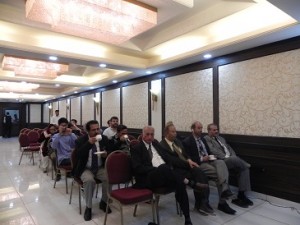
The author being an insider and an eyewitness, the book is most authentic source for future historian for understanding the truth behind the release of Sheikh Abdullah and other National Conference leaders and the fast political developments in the state that culminated in the landing of Indian troops on October 27, 1947.
The author as an witness testifies, the assertions made by many other important historians about the delegations sent by Muhammad Ali Jinnah in 1947, headed by M.D. Taseer inviting Sheikh Abdullah to Karachi before taking a decision on the future of Jammu and Kashmir. ‘Attaching paramount importance to the will of the people Taseer had told Sheikh Abdullah that state could be autonomous with right to secede, it would also have role in foreign affairs and Kashmir leaders would be part of foreign ministry.’ The book details, how the National Conference leaders at this critical point of history played a dubious role that ultimately resulted in Kashmir becoming a thorn in the neck of people in the sub-continent. 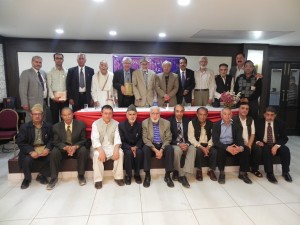
Munshi Sahib despite having remained an ardent supporter of Sheikh Abdullah in his memoirs’ nurses grouse against his leader for not informing them about atrocities committed by the soldiers of the Sikh regiment on their landing in Srinagar. 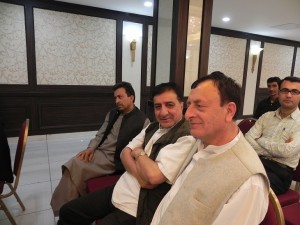
The memoirs’ for author being an insider has been eyewitness to the developments within National Conference but he has not been privy to many behind the scene development that have immensely contributed to the birth of the Kashmir tragedy. Nevertheless, editor of the memoirs Munshi Ghulam Hassan has largely made up these deficiencies with profusely written footnotes, even then the memoir stumbles on certain fact and suffers inaccuracies in details.
Talking about the Muslim Conference leadership sitting ducks, the author obviously would not know that it was at the insistence of Sardar Patel, that Sheikh Abdullah and other National Conference leaders were released under a plan and the Muslim Conference leaders continued under detention. Top most contemporary historian, Ramachandra Guha in his book ‘India After Gandhi has’ honestly written about objective behind the release of Abdullah and other NC leaders and jailing of the Muslim Conference leaders.
The book is first major documentation of the Plebiscite Front Movement. It will be of immense help to researchers working on post-1953 phase of Kashmir struggle.
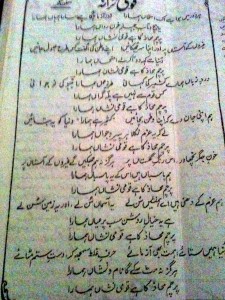 For paucity of time, I will not able to talk in detail about the Plebiscite Front and its twenty two years struggle for right to self-determination. To revive your memory of elders hear in this hall- let me exhibit the flag of this organization and read some couplet from anthem of this organization.
For paucity of time, I will not able to talk in detail about the Plebiscite Front and its twenty two years struggle for right to self-determination. To revive your memory of elders hear in this hall- let me exhibit the flag of this organization and read some couplet from anthem of this organization.
Towards the end, let me tell you Munshi Sahib was a great visionary- what he had predicted in 1969 happened in 1975, when the flag was brought out and the Front was buried.
Once again thank you very much- Majid Zargar Sahib and other friends for organizing this historical event.
3 May 2015,
Mumtaz Towers, Exhibition Road, Srinahgar
Photo Gallery of event.
Filed under: Editor's Take, Featured
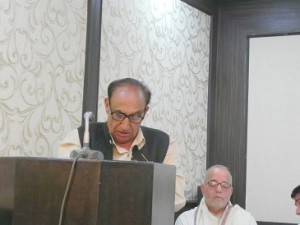
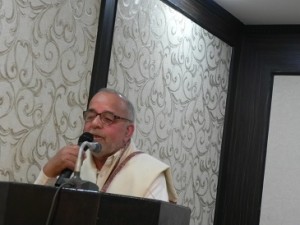
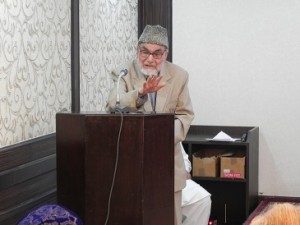
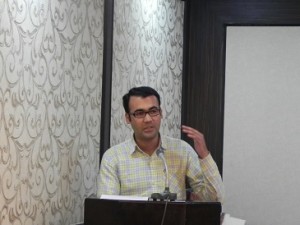
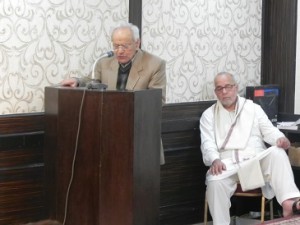
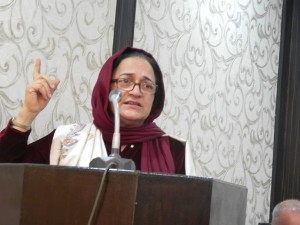
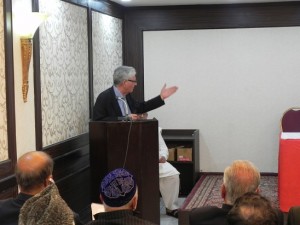
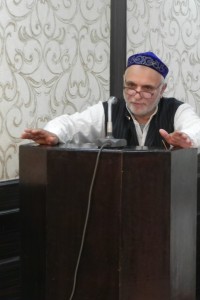








Looking at the political manoeuvring and political strategy of india towards J&K mainly right from 1931, it was intelligently organised , constant and well defined to carry it out in highly sophisticated way. They simply needed a man having popular support to give their political machinations practical support and that man they found in Abdullah Sheikh. It reminds me these few words of Maharaja Hari Singh that I sum up in my words that knowing the fact that india refused to sign stand still agreement and political unrest and instability Sheikh created in the state; knowing the sentiments of people of the state he (Maharaja)can not accede to Pakistan because Sheikh wants to go with India. This shows the extent this tall man had monopolised politics of the state with his luring policy of deceit and deception along with 40 thieves of the gang of Ali Baba that Munshi Sahib exposes the morality. The blanket ban on the material available in correspondence between Kashmiri leadership and Nehrue is proof in itself that government of india never wanted the people to know what was happening behind the curtains as it can give argument and expose the conspiracy that Ali Baba and 40 thieves were closely knitted, at the cost of independence and freedom of the state. The visit of Mr Jinnah’s emissary Mr Tasser with all the lucid propositions further gives insight into unclean political mindset of Sheikh. When I am reminded of how this tall man was crying for false like a crocodile that he was cheated, making uneducated and under educated believe that he was victim. Hundred faced man’s few faces are exposed in Munich Sahibs book. It is highly important to know the truth, what happened , who have political responsibility of hiding truth and why, why people’s aspirations were traded off by one man who had no political culture and how Abdullah Sheikh was guided and aided by congress to emerge as a strong leader to make final deal of his people. Thanks to the memoirs like that of Late Mr. MunshiSahib we get input of understanding of reasons why and how politics was manipulated for self glory rather than to uphold the aspirations of the people of the state
Looking at the political manoeuvring and political strategy of india towords J&K mainly right from 1931, it was intelligently organised , constant and well defined to carry it out in highly sophisticated way. They simply needed a man having popular support to give their political machinations practical support and that man they found in Abdullah Sheikh. It reminds me these few words of Maharaja Harry Singh, knowing the the fact that india refused to sign stand still agreement and political upheaval Sheikh created in the state; knowing the sentiments of people of the state we can not accede to Pakistan because Sheikh wants to go with India. This shows how this tall man had monopolised politics of the state with his luring policy of deceit and deception along with 40 thieves of the gang of Ali Baba that Munich Sahib exposes the morality. The blanket ban on the material available in correspondence between Kashmiri leadership and Nehrue is proof in itself that government of india never wanted the people to know what was happening behind the curtains as it can give argument and expose the conspiracy that Ali Baba and 40 thieves were closely knitted, at the cost of independence and freedom of the state. The visit of Mr Jinnah’s emissary Mr Tasser with all the lucid propositions further gives insight into unclean political mindset of Sheikh. When I am reminded of how this tall man was crying for false like a crocodile that he was cheated, making uneducated and under educated believe that he was victim. Hundred faced man’s few faces are exposed in Munich Sahibs book. It is highly important to know the truth, what happened , who have political responsibility of hiding truth and why, why people’s aspirations were traded off by one man who had no political culture and how Abdullah Sheikh was guided and aided by congress to emerge as a strong leader to make final deal of his people. Thanks to the memoirs like that of Late Mr. MunshiSahib we get input of understanding of reasons why and how politics was manipulated for self glory rather than to uphold the aspirations of the people of the state.